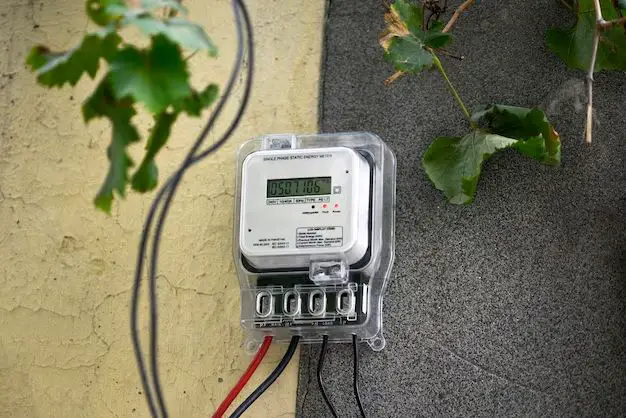Smart meters are digital devices that record electricity usage and securely send that information back to energy providers. As smart meters become more prevalent, questions have emerged about whether they use more electricity than traditional analog meters. This article examines the key factors to determine if smart meters actually increase energy consumption.
Page Contents
How do smart meters work?
Smart meters differ from analog meters in a few key ways:
- Two-way communication – Smart meters can both send and receive data wirelessly, while analog meters can only track usage.
- Real-time monitoring – Smart meters record and send energy usage frequently, even hourly or more. Analog meters only measure total usage across longer time periods.
- Advanced tracking – Smart meters collect more granular data like usage by time of day. Utilities use this to analyze peak demand periods.
This advanced functionality requires a consistent power supply to operate components like built-in communications chips. But do these features inherently lead to greater energy draw overall?
Do smart meter components use extra electricity?
It’s true the digital components in smart meters require some base level of power to work properly. For example, smart meters need constant power to:
- Run internal processor and memory chips
- Maintain uninterrupted communication capability
- Detect outages or tampering events
Additionally, smart meters connect via wireless networks and radio frequencies like cellular, Wi-Fi, or proprietary mesh networks. Transmitting energy usage data wirelessly requires electricity consumption above analog meters.
However, multiple research studies have found the actual power requirements for these extra capabilities to be minimal. The Electric Power Research Institute estimates smart meters use 1-2 watts on average. For context, a typical incandescent light bulb uses 60 watts.
Do smart meter transmissions use significant electricity?
Another concern is how much electricity is needed for frequent wireless data transmissions from smart meters. But technology improvements have kept transmission energy use low through methods like:
- Low-power radios – Communication hardware optimizes power when idle.
- Intermittent transmissions – Smart meters don’t send data constantly, just scheduled updates.
- Efficient protocols – Data transmission standards are designed for low bandwidth.
One study found smart meters only actively transmit around 1% of the time. During a 1-hour period, data transmission equated to just 3 seconds of total activity. Modern transmission networks and protocols keep electricity consumption as efficient as possible.
Do smart meters lead to more electricity use?
While smart meters require a small continuous power supply, any potential increases in total electricity use are indirect, not inherent to their operation. Some questions have emerged about whether smart meter features could lead to increased energy consumption over time, such as:
- More granular tracking – Detailed data showing spikes in hourly home usage could drive overall consumption up as people adjust routines.
- Time-based pricing – Smart meter data enables dynamic rate programs that may incentivize usage at certain times versus others.
However, while these factors represent potential shifts in energy use, they are not directly attributable to smart meters. And smarter energy management is ultimately the future, with opportunities to optimize efficiency at grid and consumer levels.
Do smart meters have efficiency advantages?
In fact, smart meters offer some tangible efficiency benefits over analog meters:
- Accurate monitoring – Smart meters eliminate estimated billing, giving detailed usage for optimization.
- Faster outage response – Real-time outage alerts support improved restoration times.
- Enhanced grid management – Utilities use smart meter data to monitor strains on the electric grid.
- Reduced costs – Remote access lowers the need for in-person meter reading and site visits.
These capabilities allow both utilities and consumers to understand energy usage patterns and needs like never before. Smarter energy management can lead to less waste and more informed optimization overall.
Do smart meters have a net energy impact?
Research suggests any increase in electricity use from smart meter power demands is negligible. One study by the Swedish Utilities Association projected an annual impact of just 1-2 kWh per meter. They estimated this would equate to a 0.1% increase in Sweden’s total annual residential electricity consumption. Such a minor net change is nearly imperceptible.
Furthermore, smart meters actually enable energy savings and efficiency capabilities that far outweigh their incremental power requirements for operation. Intelligent tracking and analysis of electricity usage empowers both utilities and consumers to optimize energy management more than ever before.
Conclusion
While smart meters introduce some new constant power demands to enable digital capabilities, those requirements are minor. Modern meter hardware and wireless networks are engineered for efficiency. The indirect effects of smarter energy data ultimately empower more informed optimization overall.
Rather than increasing electricity consumption, smart meters are a critical step toward more sustainable and efficient energy management at scale. Their incremental power needs are dwarfed by the potential for smarter analysis, usage reductions, grid coordination, and waste elimination. As digital management and connected devices continue transforming the electricity sector, smart meters provide the foundation for smarter energy use.
| Smart Meter Benefit | Description |
|---|---|
| Accurate monitoring | Eliminates estimated billing through real-time usage data |
| Faster outage response | Enables precise outage monitoring and quicker restoration |
| Enhanced grid management | Supports monitoring for grid optimization and demand management |
| Reduced costs | Lowers the need for in-person meter reading and maintenance |
References
- Redden, J. (2018). How much electricity do smart meters use? Victoria, Australia: Monash University.
- Swedish Utilities Association. (2019). How much electricity do smart meters consume? Stockholm: Swedish Utilities Association.
- Darby, S. (2010). Smart metering: what potential for householder engagement? Oxford: Environmental Change Institute.
- Faruqui, A., Harris, D., Hledik, R. (2010). Unlocking the €53 billion savings from smart meters in the EU: How increasing the adoption of dynamic tariffs could make or break the EU’s smart grid investment. Brussels: Energy Policy Institute at Chicago.
- Siano, P. (2014). Demand response and smart grids – A survey. Renewable and Sustainable Energy Reviews, 30, 461-478.
